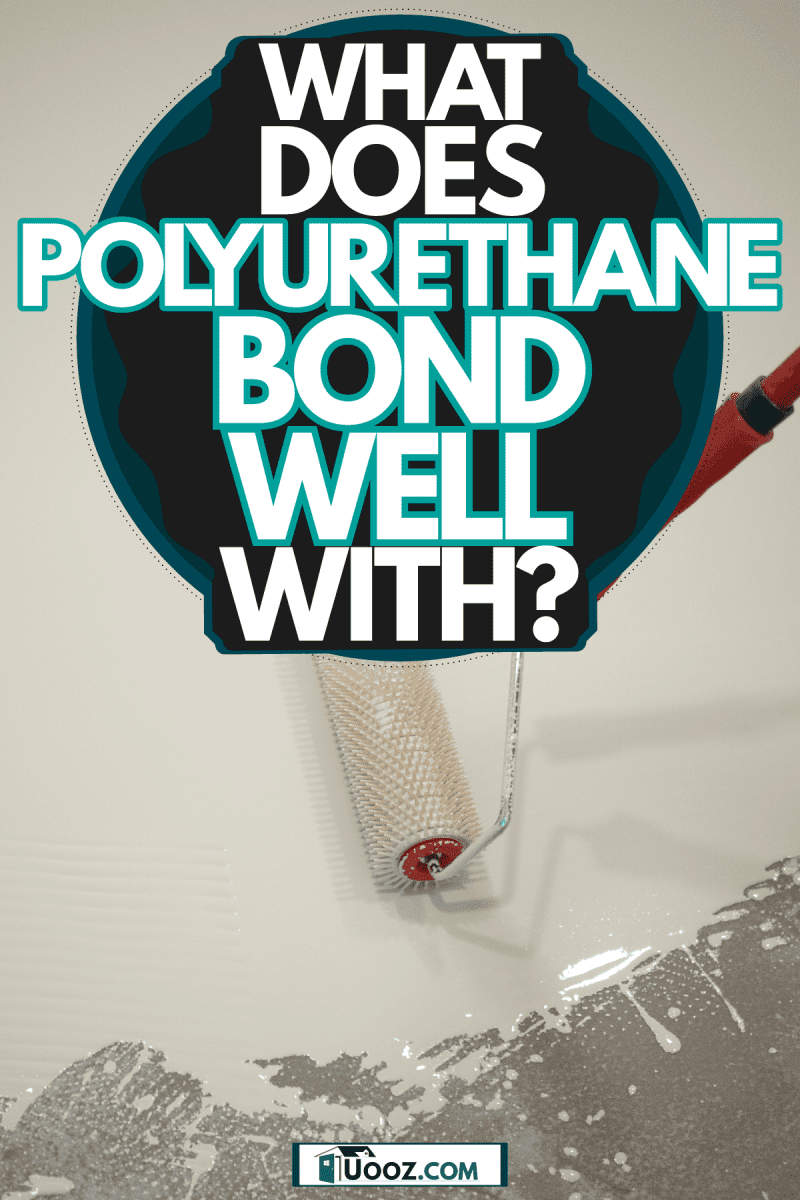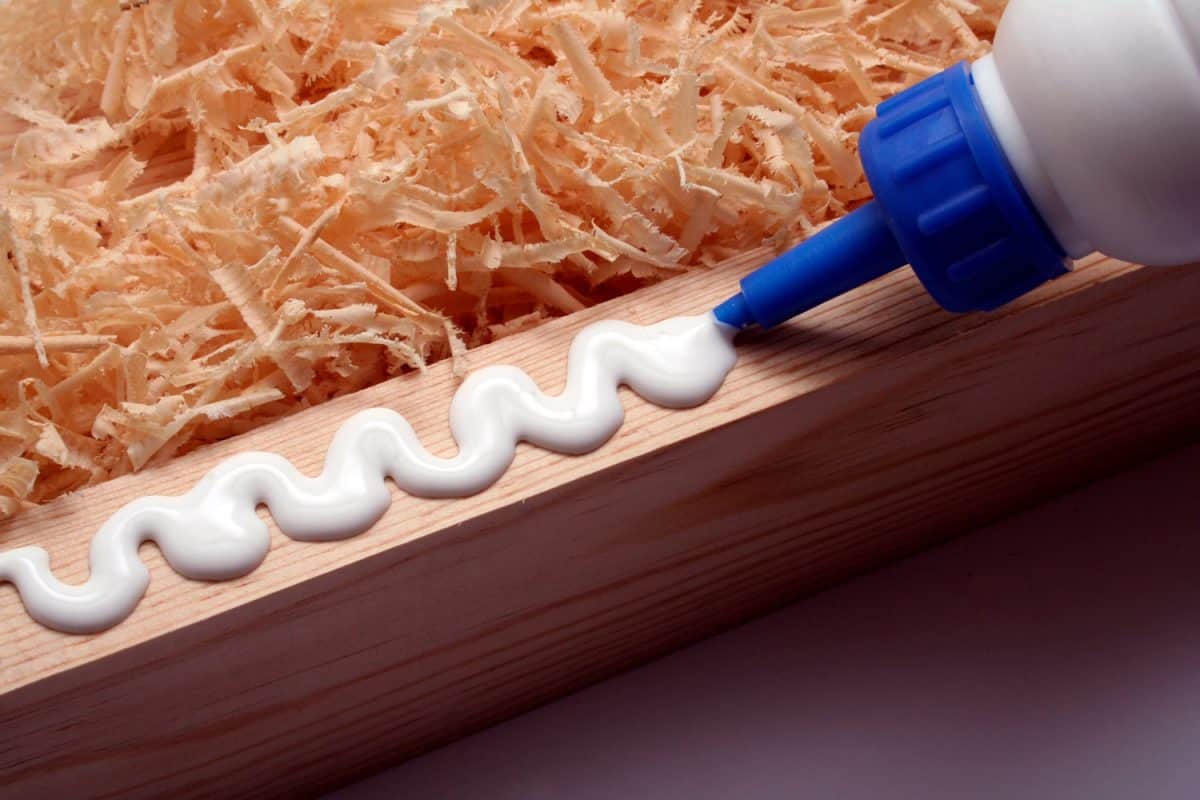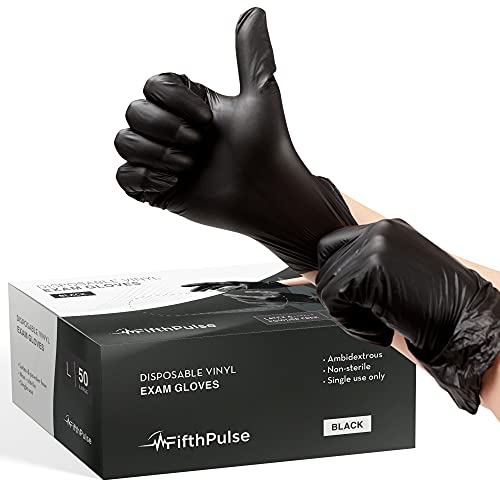Are you planning a project that you want to keep together with polyurethane glue, but you're unsure whether it will adhere? Polyurethane is a very versatile glue that is known for its ability to bond almost any material. So what does it work on? We've done the research to answer all of your polyurethane questions in one place.
Polyurethane glue bonds well with almost any material, including the following:
- Wood
- Rubber
- Metal
- Resin
- Glass
- Fabric
- Paper
- Magnets
- Most plastics
There are some things to consider before using polyurethane glues, and you may need additional tools to create a strong bond. To learn more about how to use polyurethane glue, and find out tips and tricks on using it most effectively, keep reading.

What Does Polyurethane Not Stick To?
The list of things that polyurethane glue won't stick to is much shorter than the list of materials that it actually works on. Polyurethane does not stick well when used on polyethylene, polypropylene, silicone, and polytetrafluoroethylene (non-stick PTFE coatings).
How Strong is Polyurethane Glue?
Polyurethane glue is rated at just under 3,000 pound-force per square inch (PSI). This means that it's far stronger than typical super glues and slightly weaker than high-strength PVA glues like wood glue or carpenter's glue. Polyurethane glue is a great choice for a strong bond that won't fail under moderate pressure.
What Else Will I Need to Use Polyurethane Properly?
When using polyurethane glue, you will need additional tools to get the perfect adhesion. Clamps are required to hold the two surfaces tightly together for several hours after applying the glue. You will also need a spray bottle with room temperature water if you want to glue two smooth materials together.
IRWIN Quick-Grip Clamp Set
This set of clamps contains a great variety of types and sizes that should work for any project. Click here to see them on Amazon.

How To Use Polyurethane
You should follow the directions on the product packaging for the most relevant instructions. It's important to wear gloves to protect your hands and to try to avoid getting the glue on your clothing or surrounding surfaces.
The instructions on your brand may differ, but here's a quick step-by-step guide on how most polyurethane glues are used:
- Apply a line of glue to both surfaces being adhered to. Do not apply too much; the glue will expand as it dries.
- If both surfaces are smooth and non-porous, spray the glue with a spritz of water.
- Press the surfaces together and position the clamps to hold them in place while applying a generous amount of pressure.
- Allow the glue to bond the materials together while clamped for 2-4 hours for a tight bond.
- After removing the clamps, allow the glue to finish curing for a total dry time of 24 hours.
How Long Does it Take for Polyurethane to Dry?
After 2 hours you can remove the clamps, and the glue should continue to hold without their support. The glue takes a full 24 hours to cure completely, ensuring a strong bond.
The glue should be completely cured before the project is used as intended. Dry times may need to be extended depending on the temperature and humidity levels.
Can Polyurethane Glue be Used Outdoors?
Yes, polyurethane glue is a great choice for exterior projects and repairs. It is water-resistant and can handle high temperatures on hot days. Polyurethane glue can handle weather very well, but it should not be used on projects that will be submerged. Prolonged immersion can damage the integrity of the glue and affect the bond.
Is Gorilla Glue a Polyurethane Glue?
Yes, Gorilla Glue is made using a polyurethane glue formula and is one of the most well-known brands of polyurethane glue due to its high performance. Several other brands produce polyurethane glue formulas that work just as well.
Gorilla Glue Original Formula
This Gorilla Glue is a household staple; it comes in handy for all kinds of projects. Click here to see it on Amazon.
Does Polyurethane Stick to Itself?
Polyurethane glue does not adhere well to other cured polyurethane surfaces. If you need to re-apply Gorilla Glue to a project, you should try to scrape or sand off the dried glue before re-applying. If you want to glue something to a finish with a polyurethane varnish, you will need to use a different type of glue.
Can Polyurethane Glue Withstand Heat?
Yes, polyurethane glue is very heat resistant, but different brands may have different temperature ratings. It won't melt or lose integrity until it reaches a temperature above what it is rated for, which is typically around 150°. Most polyurethane glues are flame resistant as well.
Franklin Polyurethane Glue
This polyurethane glue works well, and the bottle is big enough to tackle large projects. Click here to see it on Amazon.
What Type of Glue Should You Use for Your Project?
Polyurethane glue may be the perfect option for you, but since it does have its own limitations, you may need help finding a different kind of glue. This handy comparison website made by Gorilla Glue allows you to compare their products so you can find the right kind of glue for your needs. Click here to check it out.
What is the Difference Between Polyurethane Glue and Epoxy Glue?
Epoxy glue is a better option for submersible projects since it both bonds and laminates. It is often used in boat restoration and due to its waterproofing nature. Like polyurethane, epoxy glue will bond almost any material.
What is the Difference Between Polyurethane Glue and Wood Glue?
Wood glue is formulated specifically for use on wood, so it isn't as versatile as polyurethane glue. This glue is a great option for woodworking projects, creating an excellent wood-on-wood bond, however, to bond wood to other materials, you will need to choose a different kind of glue, like polyurethane.
Grizzly One Polyurethane Wood Glue
This polyurethane glue is specifically designed for use on wood projects. Click here to see it on Amazon.
How to Remove Polyurethane Glue
Removing polyurethane glue can be tricky due to the strong bond it creates. Acetone will help to release the glue's bond; here's how:
- Soak some cotton balls in acetone and place them on the glue or glued joint you are trying to dissolve.
- Let the acetone work on the glue for about 5 minutes, and then remove them.
- Repeat the process until the glue releases its hold.
- Once the glue releases, use more acetone-soaked cotton balls to wipe away any remaining adhesive.
How to Get Polyurethane Glue Off Skin?
If you end up getting a little glue on your skin, you should wipe it off with a wet washcloth as soon as possible. If the glue dries before you can wipe it off, try scrubbing your hands with abrasive soap, or use your regular hand soap with a teaspoon of baking soda to make it slightly abrasive. If scrubbing doesn't work, the glue will start to wear off on its own in about a week.
These gloves will provide protection when working with glue. Click here to see them on Amazon.
How to Store Polyurethane Glue?
Polyurethane glue should be stored in a dark space with regulated temperatures, like a closet or cupboard. This type of glue is activated by moisture, so humid areas should be avoided.
Before storing your glue, make sure to squeeze any air out of the bottle before you replace the cap. Another way to ensure that humidity doesn't become an issue is to place the glue bottle inside a zipper bag before leaving it on the shelf.
When to Avoid Polyurethane Glue?
You may want to avoid polyurethane glue if you need to ensure exact measurements. Since this type of glue expands as it dries, it could alter how even your joints are. If you are trying to repair something that will be filled with water, like a birdbath or a remote control boat, epoxy glue would be a better option.
Sticking it Out
Now that you know what materials polyurethane glue does and doesn't work on, you can determine whether or not it's the right glue for your project. Its tight bond is durable and waterproof, making for a lasting outcome. Remember that polyurethane glue can stick to skin and clothing, so take proper precautions when using it.
If you're still exploring different glue options and trying to determine what is best for your project, you may enjoy our article "Does Wood Glue Work On Plastic?"
For more information on fasteners that can be used instead of glue or with glue, you should read our article "20 Types Of Nails And Screws."





